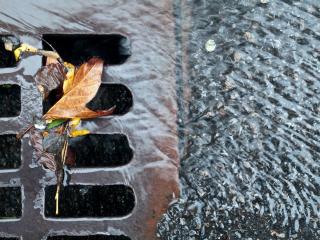MS4 Public Education

What is MS4?
The Municipal Small Separate Sewer System (MS4) Permit is comprised of six elements, which are anticipated to greatly contribute to reducing pollution to water resources if implemented collectively. The six minimum control measures of the MS4 Permit are:
- Public Education and Outreach: Municipalities are required to provide educational material to four audiences - residents, industry, commercial, and construction - on how their activities impact stormwater.
- Public Participation: Municipalities are required to provide an opportunity for the public to participate in the development/implementation of their Stormwater Management Program (SWMP) at least annually. Notices must comply with state public notice requirements.
- Illicit Discharge Detection and Elimination: Municipalities are required to proactively and systematically find and eliminate sources of non-stormwater from their storm sewer system.
- Management of Construction Site Runoff: Municipalities are required to have an ordinance for management of stormwater discharges from construction sites that disturb one or more acres of land. The ordinance should include requirements for projects to implement sediment and erosion control practices as well as requirements for site plan review.
- Management of Post Construction Site Runoff: (New Development and Redevelopment): For development and redevelopment projects that disturb one or more acres of land, municipalities are required to address stormwater runoff by retaining it on site through low impact design techniques and green infrastructure practices.
- Good Housekeeping in Municipal Operations: Municipalities are required to implement good housekeeping practices in municipal operations, create pollution prevention plans for waste management facilities and maintenance garages, carry out street sweeping at least annually, and optimize catch basin cleaning.
https://www.townofwinchendon.com/public-works/pages/winchendon-stormwater-program
So, what are some ways we can minimize our impact on stormwater?
Lawncare!
- How you manage your lawn can have a huge impact on the pollution of our waterways. Research shows that most grasses require only modest levels of nitrogen for good color and controlled growth. Too much fertilizer will make your lawn grow faster, resulting in more mowing and more clippings! Apply fertilizer to your lawn in late April and again in September. If a third treatment is needed, apply in late May. Be careful not to apply fertilizer right before rain - it will wash right away, costing you money and contributing to stormwater pollution. Think of the fish!
- Watering too often / at the wrong times can be wasteful and costly. The best time to water is in the morning because less water is lost to evaporation. Be careful not to water too often - you'd be surprised how little water grass needs to be healthy. Water deeply and less frequently to encourage deep root growth. Light, frequent watering encourages shallow
roots and may lead to increased disease and stress injury. - Save time and money and reduce waste - don't bag your grass clippings! Leaving the grass clippings on the lawn will decompost and acts as a natural, organic fertilizer.
Check out these informational flyers to learn how you can effectively care for your lawn AND protect your local waterways.
- Be a Lawn Hero - Protect Your Local Waterways
- Don't Trash the Grass
- Fertilizer - Think Blue
- Use Lawn Chemicals Wisely
























